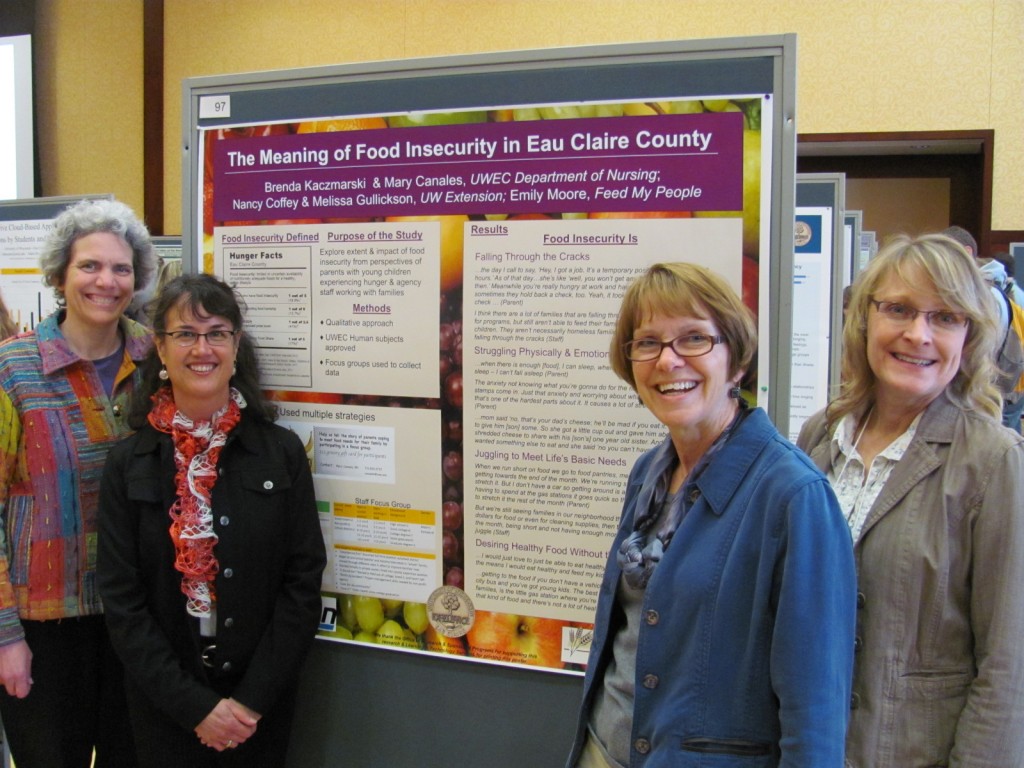EAU CLAIRE — A University of Wisconsin-Eau Claire nursing professor and students have collaborated with area agencies on research aimed at better understanding the effects of food insecurity on local residents.
Dr. Mary Canales, a UW-Eau Claire nursing faculty member interested in food and local justice issues, and public health and public policy research, collaborated with the Hunger Prevention Coalition of Eau Claire County to create a research team composed of representatives from multiple agencies to study food insecurity in Eau Claire County. The research team was an academic-community partnership that included UW-Eau Claire faculty and students; Emily Moore, director of Feed My People Food Bank; Nancy Coffey, nutrition education coordinator for the Wisconsin Nutrition Education Program through the Eau Claire County UW-Extension; and the AmeriCorps Volunteer Program.
Poverty and food insecurity are increasing in Eau Claire County, Canales said. According to 2013 U.S. Census Bureau data, 31.4 percent of residents in Eau Claire County live below 100 percent of poverty, and almost one in five children experience food insecurity.
The purpose of the research project was to gain a more in-depth understanding of food insecurity from perspectives of parents with young children who are food insecure and/or receive food assistance, and from staff at community agencies who assist individuals with food assistance needs, Canales said.
“When families are poor or low income, securing food becomes problematic,” Canales said. “There are signs of increased food insecurity as Eau Claire County poverty has increased. For example, the number of children participating in FoodShare increased 67 percent from 2006 to 2011, and the number of children participating in free or reduced-price meals rose from 28 percent in 2006 to just over 43 percent in 2012-13.”
UW-Eau Claire student Brenda Kaczmarski, a nursing student from Deer Park, and 2013 UW-Eau Claire nursing graduate Meghan Lynch, from Eau Claire, received funding through UW-Eau Claire’s Office of Research and Sponsored Programs to work alongside Canales on the project. They assisted with recruitment and logistics for seven focus groups of parents for a total of 43 participants over the course of eight months, and for one focus group with eight agency staff.
Melissa Gullickson, a 2011 UW-Eau Claire sociology graduate who is now a university services associate in the department of nursing, received an AmeriCorps grant from the Eau Claire County UW-Extension Wisconsin Nutrition Education program for her work on the project. She also assisted with recruitment and facilitated the focus group discussions. At the end of each focus group, Kaczmarski and Gullickson transcribed the recordings for analysis.
Quantitative results showed that more than half the families who participated in the study had an annual income of $20,000 or less, with 42 percent of respondents reporting that they cut the size of or skipped meals almost every month because of insufficient food and 40 percent could not afford meals.
Through qualitative analysis of the data collected, Canales and her team identified four primary themes related to the effects of food insecurity: Falling through the cracks in the system, struggling physically and emotionally with hunger, juggling to meet life’s basic needs and desiring healthy foods without the means. These themes were determined to impact all aspects of people’s lives.
Gullickson, who at one time struggled with food insecurity as a single mom, said she was able to connect with the people in the focus groups and put them at ease during the sessions.
“Participating in this research gave me an opportunity to get involved in a community issue I am passionate about,” Gullickson said. “This project really brought to light how big an issue food insecurity is in Eau Claire County. The community isn’t as informed as they should be.”
The next step for Canales and the research team is to further educate the Eau Claire community about the effects of hunger among local residents.
“The ultimate goal is to reduce the existing stigma associated with hunger and increase access to available healthy food,” Canales said.
The research results have already been presented at the UW System’s Posters in the Rotunda in Madison, UW-Eau Claire’s Celebration of Excellence in Research and Creative Activity event, the Wisconsin Public Health Association annual meeting and the Wisconsin State Prevention Conference. The academic-community partners also hosted the UW-Eau Claire presentation of the film “A Place at the Table” to highlight the struggle of hungry families in Eau Claire County.
The research team also has applied for a development grant from the Wisconsin Population Program through the UW-Madison School of Public Health to support academic-community partnerships to raise awareness about the connections between hunger and chronic disease and to educate primary care providers about hunger in the Eau Claire community. The grant will also support work on identifying specific action steps to combat food insecurity issues in Eau Claire through collaboration with hospitals, city and county governments, and people who struggle with hunger.
Kaczmarski said participating in the project gave her a different view of what working in public health is like and a deeper understanding of the people she will be working with in her future career as a public health nurse.
“From the public health perspective, food isn’t something people talk about,” Kaczmarski said. “It was eye opening to see how much people struggle. Food is a necessity that is variable. Meaning you can skip meals in order to have money to pay for other non-variable necessities, such as heat in the winter or medications, which ends up being very unhealthy. Finding the truth about how prevalent food insecurity is in the Eau Claire community was challenging, but it has helped me to be more open-minded and understanding of others and their situations.”
For more information on food insecurity in Eau Claire County, contact Dr. Mary Canales at canalemk@uwec.edu or 715-836-5737.

The academic-community research team at UW-Eau Claire’s CERCA event. From left to right: Emily Moore, director of Feed my People Food Bank, Dr. Mary Canales, Brenda Kaczmarski and Nancy Coffey, nutrition coordinator of Eau Claire County UW-Extension Office.
